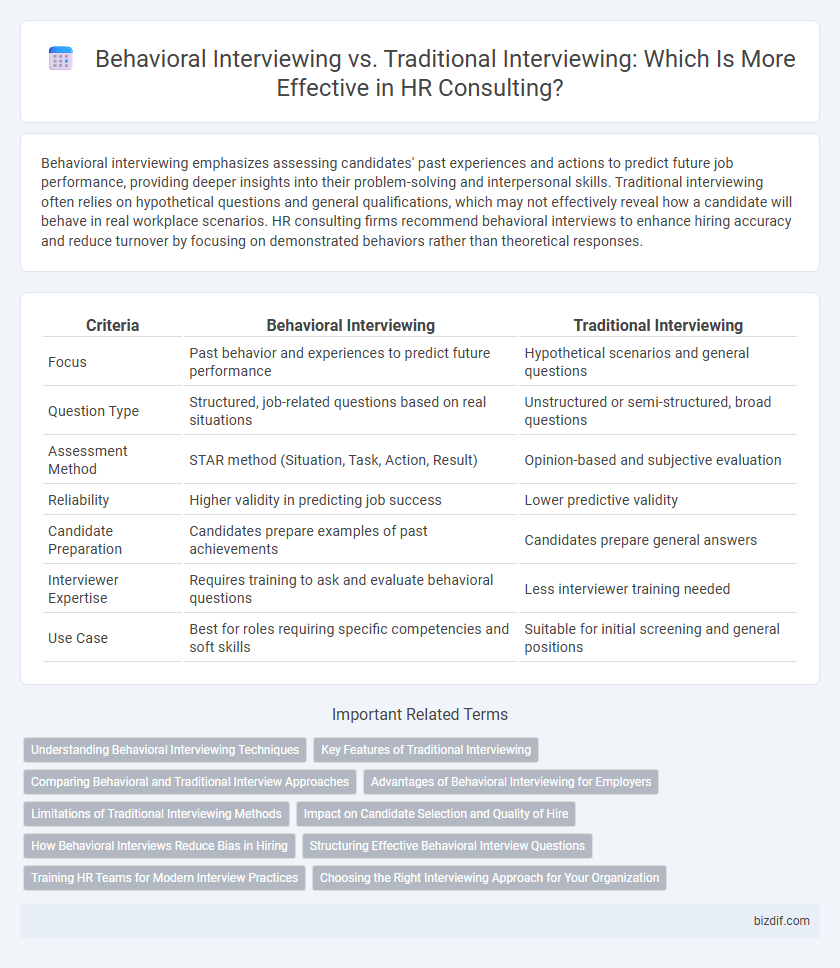Behavioral interviewing emphasizes assessing candidates' past experiences and actions to predict future job performance, providing deeper insights into their problem-solving and interpersonal skills. Traditional interviewing often relies on hypothetical questions and general qualifications, which may not effectively reveal how a candidate will behave in real workplace scenarios. HR consulting firms recommend behavioral interviews to enhance hiring accuracy and reduce turnover by focusing on demonstrated behaviors rather than theoretical responses.
Table of Comparison
| Criteria | Behavioral Interviewing | Traditional Interviewing |
|---|---|---|
| Focus | Past behavior and experiences to predict future performance | Hypothetical scenarios and general questions |
| Question Type | Structured, job-related questions based on real situations | Unstructured or semi-structured, broad questions |
| Assessment Method | STAR method (Situation, Task, Action, Result) | Opinion-based and subjective evaluation |
| Reliability | Higher validity in predicting job success | Lower predictive validity |
| Candidate Preparation | Candidates prepare examples of past achievements | Candidates prepare general answers |
| Interviewer Expertise | Requires training to ask and evaluate behavioral questions | Less interviewer training needed |
| Use Case | Best for roles requiring specific competencies and soft skills | Suitable for initial screening and general positions |
Understanding Behavioral Interviewing Techniques
Behavioral interviewing techniques emphasize analyzing candidates' past experiences to predict future job performance by asking situational questions that reveal specific competencies and problem-solving skills. Unlike traditional interviewing, which often relies on hypothetical questions and general impressions, behavioral interviews use the STAR method (Situation, Task, Action, Result) to obtain detailed and structured responses. Mastery of behavioral interviewing enhances HR consulting effectiveness by providing more reliable data to assess cultural fit and potential success.
Key Features of Traditional Interviewing
Traditional interviewing typically relies on structured or unstructured question formats focusing on candidates' past job experiences, educational background, and general skills. It often emphasizes personal impressions and subjective judgments without standardized scoring. This approach may result in inconsistent evaluations and limited predictive validity for job performance compared to behavioral interviewing methods.
Comparing Behavioral and Traditional Interview Approaches
Behavioral interviewing focuses on assessing candidates' past experiences and specific examples of how they handled workplace situations, providing insight into their problem-solving skills and cultural fit. Traditional interviewing often relies on hypothetical questions and general qualifications, which may not effectively predict future job performance. Research shows that behavioral interviews improve selection accuracy by targeting competencies directly linked to successful job outcomes.
Advantages of Behavioral Interviewing for Employers
Behavioral interviewing enables employers to predict future job performance by assessing candidates' past behaviors in relevant situations, providing more reliable indicators of skills and competencies than traditional interviews. This method reduces hiring risks through structured questions that reveal problem-solving abilities, teamwork, and adaptability, leading to better employee-job fit. Employers also benefit from objective evaluation criteria that improve consistency and minimize unconscious bias in the recruitment process.
Limitations of Traditional Interviewing Methods
Traditional interviewing methods often rely on subjective judgments and unstructured questions, which can lead to inconsistent candidate evaluations. These methods typically emphasize past experiences and qualifications without assessing specific behavioral competencies, limiting the ability to predict future job performance. The lack of standardized criteria increases the risk of biases and reduces the overall reliability and validity of the hiring process.
Impact on Candidate Selection and Quality of Hire
Behavioral interviewing improves candidate selection by focusing on past experiences and demonstrated competencies, leading to more accurate predictions of future job performance. Traditional interviewing often emphasizes hypothetical questions, which may result in less reliable assessments and poorer quality of hire. Research shows organizations adopting behavioral techniques achieve higher employee retention and stronger role fit due to better-aligned candidate evaluation.
How Behavioral Interviews Reduce Bias in Hiring
Behavioral interviewing reduces bias in hiring by focusing on candidates' past actions and specific examples rather than subjective impressions, ensuring a more objective evaluation based on real performance. Structured questions aligned with key competencies limit the influence of unconscious bias by standardizing the interview process across all candidates. Data shows behavioral interviewing improves predictive validity for job success, minimizing reliance on stereotypes often seen in traditional unstructured interviews.
Structuring Effective Behavioral Interview Questions
Structuring effective behavioral interview questions involves targeting past experiences to predict future performance, emphasizing specific situations, actions, and outcomes. Unlike traditional interviews that often rely on hypothetical questions, behavioral interviewing uses the STAR method (Situation, Task, Action, Result) to elicit detailed responses revealing candidates' problem-solving and interpersonal skills. This approach enhances predictive validity and reduces biases, leading to more reliable hiring decisions.
Training HR Teams for Modern Interview Practices
Behavioral interviewing equips HR teams with tools to assess candidates' past experiences and problem-solving skills through situational questions, enabling more predictive hiring outcomes. Traditional interviewing often relies on generic, resume-based inquiries that may overlook critical soft skills and cultural fit. Training HR professionals in behavioral techniques enhances the accuracy of talent acquisition and ensures alignment with modern organizational needs.
Choosing the Right Interviewing Approach for Your Organization
Behavioral interviewing focuses on assessing candidates' past experiences and actions to predict future performance, making it highly effective for roles requiring specific competencies and soft skills. Traditional interviewing emphasizes general questions and candidate qualifications, providing a broader overview but often lacking depth in behavior insights. Organizations should evaluate job requirements, desired employee traits, and hiring objectives to select the interviewing approach that aligns with their talent acquisition strategy and enhances candidate selection accuracy.
Behavioral Interviewing vs Traditional Interviewing Infographic

 bizdif.com
bizdif.com